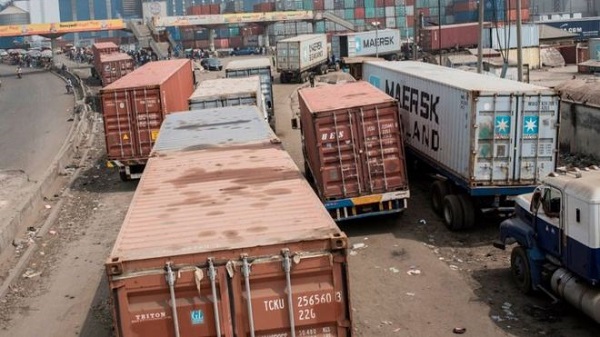
· No agency for Container Regulation in Nigeria
· Deposits equivalent to cost of expired shipping containers

· 90% of containers in Nigeria lack global standards
By Kenneth Jukpor
Shipping lines operating in Nigeria have turned the nation into a dumpsite for expired and damaged containers following the absence of a regulator to inspect standards of shipping containers brought into the country.

There are also indications that this outlook fuels the non-refund of most container deposits collected from importers and freight forwarders by shipping companies.

Container deposit refund has become one of the most problematic issues facing the port sector and freight agents in particular as traffic congestion along port access roads and other issues beyond the practitioners make timely return of the containers impossible, leading to loss of deposits and additional demurrage charges.
The conundrum, however, is further exacerbated by shipping lines as they place the value of the container deposit equivalent to the cost of used shipping containers.
Nigerian shippers, freight forwarders and organized private sector groups like Nigerian Association of Chamber of Commerce Industry, Mines and Agriculture (NACCIMA) have incessantly decried the poor quality of shipping containers usually expired and damaged, yet utilized for Nigerian imports.
Meanwhile, the 1972 Container Safety Convention (CSC), an instrument of United Nations (UN) and the International Maritime Organization (IMO) outlines the regulation for testing, inspections, approval and maintenance of shipping containers as well as the structural safety requirements and tests.
According to this IMO regulation, a container has to be thoroughly inspected by a competent professional and is considered safe for use for a given period of time by the inspector before a CSC plate is attached to it, which certifies the container for shipping services.
The CSC plate is fixed onto a container by the factory which has had its container design thoroughly tested to meet all international standards. It is then the responsibility of the container owner (shipping line) to ensure the containers are periodically examined and kept up to standard.
Therefore, container owners or major shipping lines and leasing companies have the onus of utilizing container yards that have competent inspectors for the assessment and repair of shipping containers to meet global standards and obtain requisite certification.
According to the Vice President of the Association of Nigeria Licensed Customs Agents (ANLCA) Dr. Kayode Farinto, Nigeria neglects these container standards as no agency has stepped up to inspect containers imported into the country.
“Over 90% of containers used for import into Nigeria don’t meet the global standards. The containers are not fit for import or any shipping service. The shipping companies know this and they have turned Nigeria into a dumping ground for expired containers.”
“We have been crying about this; but nobody checks these containers. Since no agency is checking the quality of these containers, shipping companies will continue to dump such containers in Nigeria and they will get away with it,” he told MMS Plus.
Farinto also called on Nigerian Shippers’ Council (NSC) as port economic regulator, to intervene as the issue has become a fiscal burden on port users following the non-refund of container deposits for the expired containers.
Speaking with MMS Plus newspaper last week, former President of National Association of Government Approved Freight Forwarders (NAGAFF) Chief Eugene Nweke gave insight into shipping companies refusal to refund container deposits.
Nweke noted that he belonged to a social media platform where shipping containers that have completed their cycle are sold outrightly for non-shipping purposes at $1000 for 20ft and $1100 for 40ft.
“This means that the price of used container is somewhere between N360,000 and N400,000. Interestingly, this is the range of the amount Nigerian shippers pay as container deposit to some shipping lines,” Nweke said.
He admonished Shippers’ Council to step up to the challenge in order to curb this unfortunate trend.
“By the time the NSC starts proper container standards administration, the application of 10% yearly depreciation (deductive) becomes a norm. If this becomes the practice, invariably shippers should be depositing little or nothing more than N20,000 as container deposit for the vovage-unworthy containers littering Nigerian ports and streets”, he said.
Although the container regulation convention is an instrument of IMO and NIMASA is Nigeria’s flag-bearer at IMO, Nweke said that Shippers’ Council with the port economic regulatory role is most suitable to administer the container standards regulation in Nigeria as the container usage attract costs via deposits paid by shippers.
He also admonished Nigeria Customs Service (NCS) to explore this role, noting that by the provisions of the Customs and Excise Management Act (CEMA), Customs treats imported containers as cargoes.
“Container falls under temporary imports because it is a means of cargo carriage. Three months after imports, if such containers are not returned to originating ports, they are considered imports,” Nweke argued.
When contacted, the National Public Relations Officer of NCS, Mr. Joseph Attah posited that Customs role in treating containers as cargoes doesn’t translate into areas of inspection or ascertaining standards of such containers.
In the UK, there are two bodies that issue qualifications to container inspectors, Bureau Veritas and International Institute of Container Lessors (IICL). Any would-be inspector need to undertake examinations to show the bodies their basic knowledge and will commonly be required to have various reference books to hand which are issued and updated by the authority.
Efforts to get clarification from NIMASA on the possible roles of the agency in this container regulation were futile up till press time.
Given that the CSC 1972 was an instrument of IMO and NIMASA is Nigeria’s representative at IMO, there are indications that the agency’s responsibility should cover container regulation.
To address the monetary concerns on container deposits, Shippers’ Council has initiated plans to eliminate payment of deposits with insurance premium tipped to substitute the age-long practice of deposit in the nation’s maritime industry.
Also speaking on the issue, the President of Association of Nigeria Licensed Customs Agents (ANLCA) Mr. Tony Iju Nwabunike said, “I think it is high time we stopped the payment of container deposit because freight forwarders have lost billions of naira”
According to him, the problem is further compounded by the fact that the shipping lines are mostly foreigners with no consideration for Nigeria’s interest as a nation.
“There is an agreement on the reverse side of the bill of lading that isn’t binding because the document can’t be issued until the vessels sail. The documents are issued on midstream so this is a trick because the shipping lines use to hide this classified information. If you have the information on time, you would be able to decide if you would use the shipping lines services or not. It is something freight forwarders, shipping lines and Shippers’ Council have to sit together to deliberate on”, Nwabunike said.
While insurance experts posit that the party with the most insurable interest should be responsible for the premium; freight agents, shippers and shipping lines may have to undergo an intellectual battle over who holds the insurable risk, as Shippers’ Council would be tasked with the onus of the mediation.
According to the Director, Consumer Affairs, NSC, Chief Cajetan Agu, Shippers’ Council is concluding plans to have an engagement with shippers, freight forwarders and shipping companies as part of efforts to introduce insurance and stop container deposits.
Recall that the League of Maritime Editors and Publishers threw its weight behind the efforts of Shippers’ Council to introduce insurance cover on empty containers used in bringing imports into the country as a replacement for the deposits being paid by importers.
Noting that importers pay as much as N200,000.00 on one empty container, the group said it was better for both the shipping companies and the shippers to consider collaboration on the payment of the insurance sum.
The group added that the introduction of insurance cover as a replacement for payment of container deposit was also a boost to the nation’s insurance industry and the economy.
Other economic experts have also tipped the substitution of container deposits for insurance to lead to massive job opportunities for indigenous insurance companies.
 MMS PLUS NG – Maritime, Aviation, Business, Oil and Gas News Online Newspaper with coverage in Maritime, Oil and Gas, Aviation, Power and Energy as well as Financial News
MMS PLUS NG – Maritime, Aviation, Business, Oil and Gas News Online Newspaper with coverage in Maritime, Oil and Gas, Aviation, Power and Energy as well as Financial News









